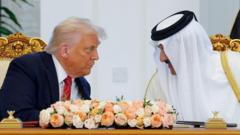In an unprecedented turn of events, President Donald Trump finds himself facing criticism from both his supporters and detractors concerning a potential plane deal with Qatar, prompting discussions about ethics and foreign influence.
Trump's Qatar Plane Gift Sparks Unlikely Bipartisan Backlash

Trump's Qatar Plane Gift Sparks Unlikely Bipartisan Backlash
Controversy erupts as President Trump's potential acceptance of a luxury jet from Qatar draws criticism from allies and opponents alike.
In a move likely to inflame political tensions, President Donald Trump has sparked a notable bipartisan backlash with his decision to potentially accept a luxury Boeing 747-8 jet from Qatar, valued at around $400 million. While traditionally Trump's supporters would rally around him, many within his base, including fervent Maga influencers, are expressing discomfort, labeling the arrangement as a "bribe" and highlighting implications of corruption, contrary to Trump's pledges to eliminate such practices.
The Qatari government has indicated the jet is intended for the U.S. Department of Defense's fleet, including Air Force One, the official aircraft for the president. However, questions linger regarding the motivations behind this generous gift. Critics have pointed to Qatar’s alleged ties to terrorism, with figures like conservative commentator Ben Shapiro openly questioning the intentions behind the aircraft donation. Even higher-profile conservatives like Laura Loomer have broken ranks, describing the deal as a "stain" on Trump's legacy.
The response from the White House has been a firm defense of the proposal. Trump's press secretary, Karoline Leavitt, emphasized compliance with laws in regard to foreign gifts while the president himself downplayed accusations of impropriety. Trump argued that it would be foolish not to accept the gift, invoking historical precedents of goodwill between nations.
Despite the administration's stance, some senior Republicans are voicing concerns about the implications of the deal. Senator Rand Paul expressed worries about the appearance of impropriety and the potential impact on U.S.-Qatar relations regarding human rights. Senator Ted Cruz echoed similar sentiments, citing risks of espionage. Conversely, there are still supporters within Trump's party, with Senator Tommy Tuberville asserting that accepting the gift might benefit the nation, especially in a time of tightened budgets.
This blending of criticism from various political spectrums highlights a significant challenge for Trump as he navigates public perception around foreign ties and ethical governance. Political strategist Doug Heye proposed that while this may pose immediate challenges, Trump’s history of turning scandals into mere footnotes in his narrative might shield him from long-term damage to his popularity.
As developments unfold, the situation encapsulates the complexities of Trump's presidency, where alliances shift rapidly, and the reactions to foreign relationships remain a contentious subject in American politics.
The Qatari government has indicated the jet is intended for the U.S. Department of Defense's fleet, including Air Force One, the official aircraft for the president. However, questions linger regarding the motivations behind this generous gift. Critics have pointed to Qatar’s alleged ties to terrorism, with figures like conservative commentator Ben Shapiro openly questioning the intentions behind the aircraft donation. Even higher-profile conservatives like Laura Loomer have broken ranks, describing the deal as a "stain" on Trump's legacy.
The response from the White House has been a firm defense of the proposal. Trump's press secretary, Karoline Leavitt, emphasized compliance with laws in regard to foreign gifts while the president himself downplayed accusations of impropriety. Trump argued that it would be foolish not to accept the gift, invoking historical precedents of goodwill between nations.
Despite the administration's stance, some senior Republicans are voicing concerns about the implications of the deal. Senator Rand Paul expressed worries about the appearance of impropriety and the potential impact on U.S.-Qatar relations regarding human rights. Senator Ted Cruz echoed similar sentiments, citing risks of espionage. Conversely, there are still supporters within Trump's party, with Senator Tommy Tuberville asserting that accepting the gift might benefit the nation, especially in a time of tightened budgets.
This blending of criticism from various political spectrums highlights a significant challenge for Trump as he navigates public perception around foreign ties and ethical governance. Political strategist Doug Heye proposed that while this may pose immediate challenges, Trump’s history of turning scandals into mere footnotes in his narrative might shield him from long-term damage to his popularity.
As developments unfold, the situation encapsulates the complexities of Trump's presidency, where alliances shift rapidly, and the reactions to foreign relationships remain a contentious subject in American politics.





















